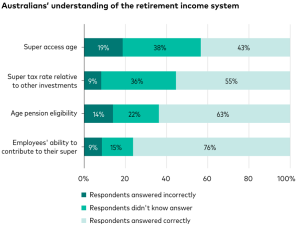Most Australians are failing the retirement test
By Tony Kaye, Senior Personal Finance Writer
Retirement
Here are four basic retirement questions many people struggle to answer correctly.
They are four fairly basic statements related to Australia’s retirement income system that every working and retired person should ideally be able to answer correctly as either true or false.
- Super fund members can access their superannuation after reaching the age of 50. (False).
- Superannuation is taxed at a lower rate than other investments (except for owner-occupied housing). (True).
- Everyone in Australia over the age 67 is eligible to get the Age Pension if they pass the resident rules, income test, and assets test. (True).
- Employees cannot contribute into their own superannuation funds – only an employer can make contributions. (False).
Yet, Vanguard’s 2024 How Australia Retires research shows a high percentage of Australians don’t know the basics, let alone the countless, more complex, super, pension, tax and other regulations that apply to the nation’s almost $4 trillion retirement system.
Below are the true and false responses to the four statements above, asked to the 1,800 working and retired Australians in March this year who participated in Vanguard’s latest retirement research.
Lacking confidence or accuracy
- Almost two in three Australians (57%) lacked confidence or accuracy about the age at which they can access their superannuation.
- Almost one in two Australians (45%) do not know or are unsure if superannuation is taxed at a lower rate than other investments.
- One in three Australians (36%) do not know or are unsure of the Age Pension eligibility rules.
- Around one in four Australians (24%) do not know or are unsure if they are allowed to make additional contributions to their superannuation.
That many Australians have a patchy understanding of the retirement system is concerning. But it’s not surprising given the intricate rules that frame how much individuals can contribute to super at the concessionally taxed (15%) rate (which can include carry-forward contributions from previous financial years), and how much money can be held in an account-based pension (known as the transfer balance cap).
Vanguard’s research findings suggest more needs to be done to support working-age and retired Australians to better understand and more effectively navigate Australia’s retirement income system.
Long-term repercussions
As noted in our Smart Investing article, Many Australians have a fear of running out, a high percentage of Australians are concerned about outliving their retirement savings.
This finding links closely with the broader lack of literacy among many Australians related to the retirement savings system as well as to investing in general.
Vanguard’s research found that when it comes to managing finances in general, only one-third of Australians are very confident or extremely confident in making financial decisions.
When asked about their understanding of various financial products and services, the majority of Australians (56%) said they are extremely confident in their knowledge about savings and deposit accounts. But they are much less confident in their understanding of investment products such as shares (20% are very or extremely confident), managed funds (16%), exchange traded funds (ETFs) (13%) and bonds (10%).
Less than one third are very or extremely confident in their understanding of super products.
An alarming finding from the research was that almost half of working-age Australians (49%) have not made any personal (additional) contributions to their super, and more than a quarter (27%) have no plans to make future personal contributions as part of their retirement plan.
While there is no easy and quick solution to addressing the broad lack of engagement by many Australians with the retirement system, better education and access to quality financial advice are key.
An adviser can guide you in a wide range of areas including saving and budgeting, super contributions, investment strategies, debt management, insurance coverage, and estate planning.
There is no doubt that more can be done on a broad co-ordinated level to improve financial literacy across Australia.
At the same time, there are also obvious steps you can take to improve your knowledge, which can readily be accomplished with help from a professional adviser.
View the full 2024 How Australia Retires report.


